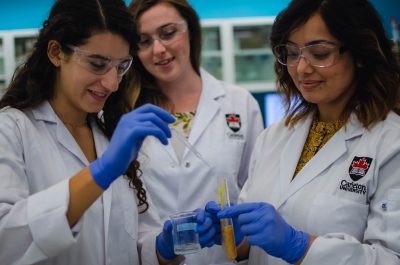
Recently, Associate Vice-President (Teaching and Learning), David Hornsby, announced the outstanding educators who have been named 2022 Carleton University Teaching Award winners. The Department of Chemistry’s very own Trinda Crippin has been awarded the Excellence in Learning Support Award!
Trinda is an extraordinary colleague and lab coordinator who is passionate about student success and positively impacts student experiential learning in the Faculty of Science. Recently (October 2021), Trinda completed the Student Support Certificate, with concentrations in Equity Diversity and Inclusion, and Student Mental Health and Well-Being. Trinda brings a genuine interest in student learning, and is an exceptionally strong contributor to teaching initiatives and learning development in the Department of Chemistry.
As a member of the Departmental Priorities Committee, Trinda aided in the development of the first ever strategic plan in the Department of Chemistry. Trinda conducted environmental scans of Canadian chemistry and food science programs to compare experiential opportunity offerings. She designed and analyzed surveys to capture current departmental teaching practices, and is now working to advance our strategic operational plan.
Trinda has broad expertise in chemistry and food science. She is responsible for four distinct food science and two chemistry laboratories. Her expertise spans aseptic microbiology techniques, food chemistry, chemical and food analysis, and organic chemistry. As such, Trinda played a central role in the development of learning outcomes for the Food Science program and its courses.
In her very first summer with us, Trinda participated in the review of learning outcomes for all Food Science laboratories and was dedicated to implementing the recommended changes. This resulted in a dramatic improvement in our Food Science laboratories and student satisfaction.
Trinda’s experience with learning outcomes proved to be extremely valuable in May 2020 as we pivoted to online laboratory development for the next 18 months. She emerged as a leader in developing virtual labs in the Department of Chemistry. Trinda developed and has successfully implemented a lab structure consisting of short concept videos as the students’ first interaction with content and included low-stakes learning activities for students to learn through applying the knowledge gained. This includes activities such a critiquing lab techniques or lab reports, not only to identify errors, but to predict the consequences or these errors and propose solutions or alternative means to reach the same experimental goals.
Trinda’s structure focusses therefore not just on ‘doing’ experiments, but on understanding and integrating concepts by applying knowledge. Essentially, Trinda encourages students to reflect on their learning in order to draw connections between different concepts both within the lab content and with concepts from other courses. Much like a coach, experimenting with approaches that enable students to arrive at an answer depending on how they best learn is something Trinda excels at and is what helps her students become life-long learners.
Recently, Trinda has embarked on developing or adapting laboratory experiments for two other cohorts: 1) high school students for a brand-new Food Science course in the Mini-Course Enrichment Program, and 2) existing students for a micro-credential aimed at back-filling essential hands-on skills missed by students during the pandemic.
The Department of Chemistry is so thankful for the excellent work that Trinda does, and we are all so proud of her! Congratulations Trinda!